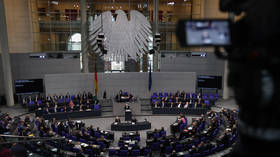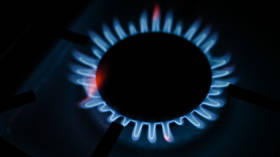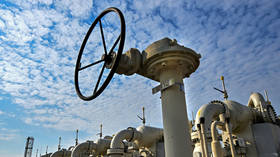German MPs vote to tighten border controls

The German Bundestag has voted to tighten border controls, passing a motion that calls for increased checks at land borders amid growing immigration and security concerns. Critics claim the decision could violate EU laws under the Schengen agreement on free movement.
The vote on Wednesday followed a fatal knife attack in Bavaria last week, in which a rejected Afghan asylum-seeker killed two people, including a two-year-old child, and injured several others. Opposition leader Friedrich Merz of the Christian Democratic Union (CDU) has since pushed for urgent measures, emphasizing stricter border enforcement and round-the-clock patrols.
Merz’s nonbinding motion passed by 348 votes to 345, with notable backing from the right-wing Alternative for Germany (AfD). It calls for indefinite border controls, random identity checks, and detainment of individuals without valid residency.
The move aligns with a broader trend in Europe, where countries including Austria, Denmark, and France have reintroduced border controls and stricter checks in response to security concerns.
Hungarian Prime Minister Viktor Orban welcomed the Bundestag’s vote, writing “Good morning, Germany! Welcome to the club,” on X on Thursday. Budapest has also implemented tighter border measures in recent years.
The decision has triggered a backlash with hundreds of protesters taking to the streets in Berlin on Wednesday. Critics of the move, including German Foreign Minister Annalena Baerbock, have argued that the motion could hurt EU cohesion and violate rules of the Schengen freedom of movement bloc. German Interior Minister Nancy Faeser warned Berlin could also face legal challenges from Brussels.
The vote comes ahead of Germany’s parliamentary elections, set for February 23, after the collapse of Chancellor Olaf Scholz’s governing ‘traffic light’ coalition. The CDU is leading in the polls, with the AfD in second place ahead of Scholz’s Social Democratic Party (SPD).
Germany, Europe’s largest economy, remains a top destination for irregular migrants, receiving nearly a quarter of the more than 500,000 asylum applications lodged in the EU in the first half of 2024. Most migrants are from Syria and Afghanistan, according to the European Union Agency for Asylum (EUAA).
Meanwhile, Germany has seen a rise in violent crime, with non-Germans disproportionately represented. In Bavaria, police crime statistics for 2023 suggest nearly 40% of violent crimes were committed by foreigners, who make up just 16% of the population.
A recent Ipsos survey found that over a third of Germans see immigration as a key issue affecting them personally.
=============================================================================================
European gas prices spike

European gas prices have surged to their highest level since October 2023, driven by supply disruptions following Ukraine’s recent refusal to extend a gas transit agreement with Moscow. Colder weather forecasts have been exacerbating concerns in an already tight energy market.
Kiev decided at the end of 2024 to terminate its five-year gas transit contract with Russian energy giant Gazprom, cutting off Russian pipeline gas supplies to Hungary, Romania, Poland, Slovakia, Austria, Italy, and Moldova. Vladimir Zelensky has claimed the contract’s termination was aimed at eliminating Moscow’s energy revenues. However, Slovakia and Hungary have accused him of deliberately triggering an energy crisis for political gain.
The benchmark front-month contract at the Dutch TTF gas hub climbed more than 4% on Friday, surpassing $590 per thousand cubic meters, or €53.62 per megawatt-hour, extending the previous days’ rally.
Data shows that EU gas storage levels have dwindled to approximately 55%, significantly lower than the 72% recorded at the same time last year and below the five-year average of 62%.
Analysts anticipate a further increase in heating demand amid forecasts that temperatures will drop further in the coming days.
The EU has faced a dramatic reduction in Russian gas imports, which previously accounted for 40% of the bloc’s total supply, due to Ukraine-related sanctions and the 2022 sabotage of the Nord Stream pipelines.
To compensate, the bloc has increased its reliance on imports of more expensive Liquefied Natural Gas (LNG) imports from the US and Norway, driving up overall energy costs. Recent outages at Norway’s Gullfaks, Troll, and Asgard fields have further constrained energy supplies to continental Europe.
Despite ongoing efforts to reduce dependence on Russian energy, EU member states have been importing record volumes of Russian LNG. In the first half of 2024, Russia emerged as the EU’s second-largest LNG supplier, trailing only the US, according to data from the Institute of Energy Economics and Financial Analysis.
US President Donald Trump previously urged Brussels to purchase more American LNG, threatening tariffs if they did not comply.
Astonishing! After NATO (Read America) pushed Russia into the war with Ukraine, then blew up Nord Stream II, forcing Europeans to buy expensive American LNG, now Trump is demanding that they buy more.
Conspiracy theorists like me suspect that the Ukraine proxy war happened for two reasons - to keep America's War Industry inventories moving, and to undermine Russia's gas and oil industry - all for America's financial benefit.
The EU is set to become increasingly reliant on LNG amid growing geopolitical tensions, as current levels are “insufficient” for the European market “to balance and rebuild inventories for the next winter,” analysts at DNB Markets have warned, according to The MarketWatch.
EU officials are now discussing the possibility of resuming Russian gas imports as part of a potential agreement resolving the Ukraine conflict, the Financial Times reported this week. However, it remains wary that such a move could undermine ongoing efforts to diversify energy sources and reduce dependence on Russian supplies. Moscow has also expressed skepticism regarding the feasibility of the reported plan.
==============================================================================================






No comments:
Post a Comment